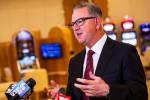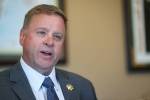Facing declining tax revenue, Gibbons warns of cuts
CARSON CITY -- Gov. Jim Gibbons said Tuesday that he already has begun talking with legislative leaders about potential cuts that might be necessary because of declining tax revenue and could require action in a special legislative session.
"If it gets to a point where we no longer can make adjustments, we will have to consider a special session and get the Legislature's help," the governor said.
But at least one Democratic legislative leader said it's premature to call the Legislature into special session.
Gibbons said he warned legislators in the spring not to raise taxes or increase spending beyond the levels he proposed because of the possibility that tax revenues would continue to decline and budget cuts would be needed.
The Gaming Control Board reported Tuesday that gaming industry winnings from players have declined for 18 straight months. Gaming taxes fund 27 percent of state spending.
"The issue is about spending," Gibbons said. "We (his administration) were very conservative in our approach, and the Legislature decided to make changes on their own that increased taxes by $1 billion. (Now) we are seeing we don't have the revenue to meet that spending request."
Legislators approved a $6.9 billion, two-year budget, compared with the $6.17 billion budget proposed by Gibbons.
Gibbons said he has spoken with state Senate Minority Leader Bill Raggio and Sen. Randolph Townsend, both R-Reno, about his concerns, but not with any Democrats.
Assembly Majority Leader John Oceguera, D-Las Vegas, said in an interview that it's premature to talk about a special session.
He said revenue figures for the entire July-through-September quarter should be considered before the governor talks special session.
"Based on the economic indicators we are seeing, the numbers should be flat, not heading downward," Oceguera said. "If they are flat or begin to increase, we will be in decent shape. If they are headed downward, we won't be in good shape."
The governor was forced to call two special legislative sessions in 2008 to deal with revenue shortfalls.
The Legislature meets only during odd-numbered years and is not scheduled to hold its next session until 2011. In recent years, governors frequently have called legislators back for special sessions.
Both special sessions in 2008 lasted just one day because Gibbons and legislative leaders had reached agreements on what should be done.
Calling a special session, would frustrate legislators who are seeking campaign contributions for their 2010 races for re-election or to other offices. They would be prevented from taking contributions for 15 days before and 15 days after the session.
Gibbons spoke with reporters in the Capitol soon after the Gaming Control Board released its June report showing a 13.8 percent decline in revenues collected by casinos.
The figures were for June play in casinos, but the taxes the state received from the gaming industry were paid in July, during the new fiscal year. The fiscal year for the gaming industry starts in June, not July 1 as for other businesses.
The Economic Forum estimated on May 1 that gaming revenue would increase by 3.4 percent in the current fiscal year.
That means in the first month of the new fiscal year, gaming taxes already are about $10 million short of the Economic Forum forecast. The forum's forecast was binding on Gibbons and the Legislature in creating the two-year budget for the period of July 1, 2009, to June 30, 2011.
Gibbons said he has been meeting with gaming executives to find out how he can promote more tourism. He said he did interviews Monday with California TV stations to induce companies to relocate to the Silver State.
Contact Capital Bureau Chief Ed Vogel at evogel@reviewjournal.com or 775-687-3901.























